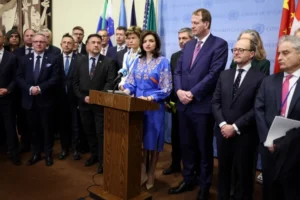In a stunning turn of events that has left Western allies reeling, the United States has aligned with Russia in two key United Nations votes on Ukraine, marking a seismic shift in global diplomacy. The move has sparked outrage among European leaders, raised serious questions about Washington’s commitment to Kyiv, and fueled speculation about the future of US foreign policy under President Donald Trump.
The votes, which coincided with the third anniversary of Russia’s full-scale invasion of Ukraine, sent a clear message that Washington is reshaping its geopolitical alliances. The US opposed a European-backed UN General Assembly resolution condemning Russia’s war and instead co-sponsored a separate Security Council resolution that called for a swift end to the conflict but omitted any mention of Russian aggression or Ukraine’s territorial sovereignty. This dramatic departure from previous US policy signals a growing divide between Washington and its Western allies.
The European-backed resolution, which received support from 93 countries, explicitly condemned Russia’s invasion and demanded its complete and unconditional withdrawal from Ukrainian territory. However, in a move that caught many by surprise, the US joined a small group of nations—including Russia, Israel, North Korea, Sudan, Belarus, and Hungary—in voting against it. Instead of backing its European partners, Washington advanced a more neutral resolution that called for de-escalation and peace talks while carefully avoiding language that might directly implicate Moscow.
The US-drafted resolution was met with resistance from European nations, which attempted to amend the text to include stronger language about Ukraine’s sovereignty and Russia’s role as the aggressor. However, these amendments were blocked by Russian vetoes, leaving the final version of the resolution devoid of any meaningful condemnation of Moscow’s actions. When the resolution came to a vote in the UN Security Council, it passed with the support of 10 out of 15 members. France, the United Kingdom, Denmark, Greece, and Slovenia abstained, further exposing the rift between the US and its traditional allies.
Russia swiftly capitalized on the diplomatic victory, with Russian UN Ambassador Vasily Nebenzya praising the resolution as a constructive step toward peace. He described it as a future-oriented document that prioritized dialogue over confrontation. The response from Washington was equally striking, with US Charge d’Affaires Dorothy Shea defending the decision and calling the resolution a crucial first step toward ending the conflict.
For Ukraine, however, the votes were a crushing blow. Ukrainian Deputy Foreign Minister Mariana Betsa did not hide her frustration, arguing that the decision to omit references to Russian aggression amounted to a betrayal. She emphasized that any resolution on Ukraine must reaffirm the country’s sovereignty and hold Russia accountable, warning that failing to do so would set a dangerous precedent for international law and global security.
The broader implications of this policy shift are profound. By breaking with its European allies and signaling a willingness to engage diplomatically with Moscow, the US is reshaping the global balance of power. European leaders, who have relied on US leadership in countering Russian aggression, are now left grappling with the reality of a more unpredictable and transactional Washington. The abstentions from key European nations in the Security Council vote highlight growing discontent with the US approach and may foreshadow a more divided Western response to the war moving forward.
For Ukraine, the most pressing concern is whether this shift signals a weakening of Western military and financial support. Over the past three years, Kyiv has depended heavily on US-led assistance to sustain its defense against Russia’s invasion. If Washington continues to soften its stance, European nations may be forced to shoulder a greater share of the burden—a prospect that could strain resources and undermine Ukraine’s ability to resist Russian advances.
For Russia, this represents a significant diplomatic win. By securing US cooperation on a UN resolution that avoids directly blaming Moscow, the Kremlin has successfully shifted the international narrative in its favor. The fact that the US, the world’s most powerful nation, chose to co-sponsor a resolution that omits any mention of Russian aggression sends a clear signal that Washington is willing to reconsider its approach to the conflict.
As the dust settles, one thing is clear. The days of unquestioned US support for Ukraine are over. The realignment of global alliances is underway, and the consequences will shape the future of international diplomacy for years to come.
Stay informed with the latest news from Nigeria and beyond! Join us on WhatsApp or Telegram for real-time updates. Have a report or article? Send it to report@trendingnaijanews.com. Follow us on X (Twitter), Instagram, LinkedIn, YouTube, TikTok, and Facebook for more updates!


